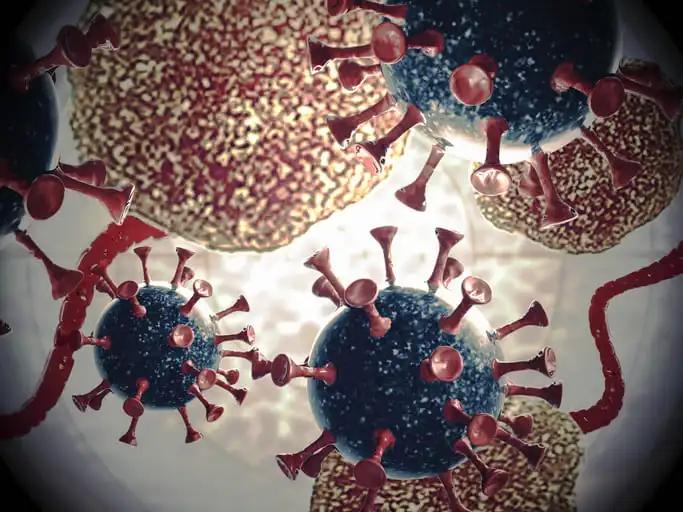KEY TAKEAWAYS
- The EV-202 phase 2 trial aimed to evaluate EV monotherapy in TNBC and HR+/HER2- BC, expanding its approved use beyond urothelial cancer.
- The primary endpoint was confirmed ORR.
- EV demonstrated antitumor activity in heavily treated TNBC, with manageable safety profiles consistent with prior reports.
The Nectin–4–directed antibody-drug conjugate enfortumab vedotin (EV) is approved for urothelial cancer treatment. It targets Nectin-4 expressed in various solid tumors, including breast cancer (BC).
Antonio Giordano and the team aimed to assess EV monotherapy in triple-negative breast cancer (TNBC) and HR+/HER2- BC, expanding its approved use beyond urothelial cancer.
In this open-label, multicohort, phase 2 trial, eligible adults with locally advanced or metastatic solid tumors, measurable disease, and ECOG PS 0–1 were enrolled. BC cohorts required prior taxanes or anthracyclines, ≥1 standard-of-care cytotoxic regimen, and ≤2 lines of cytotoxic therapy for locally advanced or metastatic breast cancer. Patients also had prior PD-1/L1 inhibitor (TNBC) or endocrine treatment with a CDK4/6 inhibitor (HR+/HER2- BC).
Nectin-4 expression was not mandatory but assessed retrospectively. Participants received EV 1.25 mg/kg intravenously on days 1, 8, and 15 of each 28-day cycle until meeting discontinuation criteria such as disease progression or unacceptable toxicity.
The primary endpoint was confirmed objective response rate (ORR), with ≥10 responders needed for TNBC and ≥12 for HR+/HER2- BC out of 40 evaluable patients to claim promising antitumor activity. Secondary endpoints included duration of response (DOR), disease control rate (DCR), progression-free survival (PFS), overall survival (OS), and safety/tolerability. Investigator-assessed antitumor activity was evaluated per RECIST v1.1.
In the TNBC cohort, 42 female patients had received EV as of March 3, 2023, with a median follow-up of 11.8 months. Their median age was 53 years, 64% had undergone at least 2 lines of systemic treatment for metastatic BC, and 33% had prior sacituzumab govitecan therapy. ORR was 19.0%.
Grade ≥3 treatment-related adverse events (TRAEs) occurring in more than 1 patient included decreased neutrophil count (n=3, 7%), decreased white blood cell count (n=2, 5%), and increased aspartate aminotransferase (n=2, 5%). Selected TRAEs of special interest were skin reactions (n=25, 60%), peripheral neuropathy (n=11, 26%), and hyperglycemia (n=2, 5%). In the HR+/HER2- BC cohort (median age, 57.0 years), 45 female patients had received EV as of December 3, 2022, with a median follow-up of 11.2 months.
Most (73%) had undergone at least three lines of systemic treatment for metastatic breast cancer. The ORR was 15.6%. Grade ≥3 TRAEs occurring in more than one patient were maculopapular rash (n=7, 16%), pruritus and increased aspartate aminotransferase (both n=3, 7%), and abdominal pain and erythema (both n=2, 4%). Selected TRAEs of special interest were skin reactions (n=28, 62%), peripheral neuropathy (n=12, 27%), and hyperglycemia (n=5, 11%).
The study concluded that EV demonstrated antitumor activity in heavily pretreated TNBC, with safety profiles consistent with prior reports in both cohorts.
The trial was sponsored by Astellas Pharma Global Development, Inc.
Source: https://meetings.asco.org/abstracts-presentations/233643
Clinical Trial: https://clinicaltrials.gov/study/NCT04225117
Giordano A, Ali AA, Bruce JY, et al. (2024). “Enfortumab vedotin (EV) in triple-negative breast cancer (TNBC) and HR+/HER2- breast cancer (BC) cohorts of EV-202.” Presented at ASCO 2024, J Clin Oncol 42, 2024 (suppl 16; abstr 1005), DOI: 10.1200/JCO.2024.42.16_suppl.1005 (1005)



